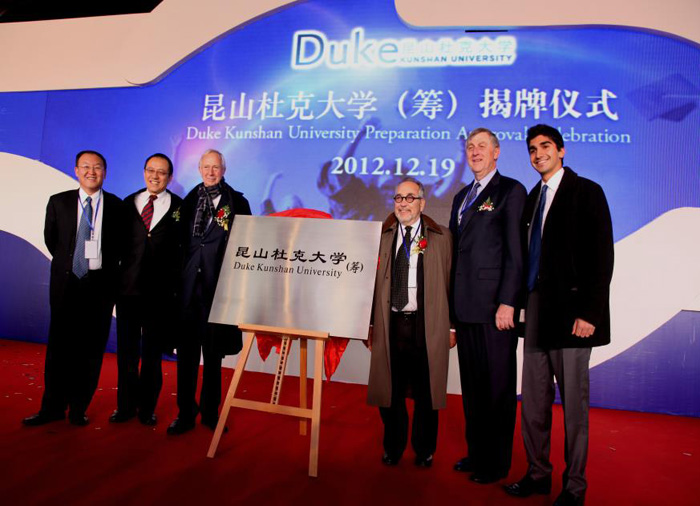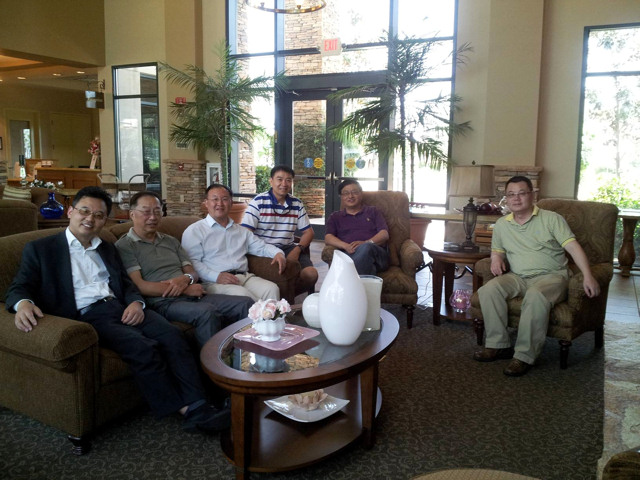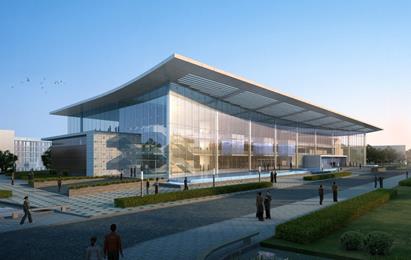|
 |
|
| 杜克昆山大学落成回顾(Duke Kunshan University-Quick Reference) |
|
| 2013/5/7 4:57:52 | 浏览:6780 | 评论:1 |
|
|
|
|
|
Overview:
Mr. Bruce Jiang and his team have played a crucial role in introducing the world-renowned university – University of Duke to Kunshan and worked all the way through its landing in Kunshan, Jiangsu, China. The following is a brief summary of the process during the past 5 years:

Duke University, Wuhan University and the city of Kunshan, China, have formed a partnership to create Duke Kunshan University(DKU), a proposed new joint venture university to be located in Kunshan, Jiangsu Province, China.
Kunshan is a prosperous, forward-thinking and rapidly expanding city in the Yangtze River Delta. Kunshan is funding the construction of the 750,000 square feet of the initial campus on a 200-acre site within a science park owned by the city.
Wuhan University is one of the oldest universities in China, and is consistently ranked within the top 10 comprehensive institutions in the country. Wuhan is Duke’s academic partner for the creation of DKU.
Duke is also establishing partnerships for specific academic programs with additional leading universities in China.
DKU must receive approval from China’s Ministry of Education(MOE)in order to offer degree programs at DKU. DKU’s MOE application had been approved on 2012.8.19 .
Duke University faculty and Board of Trustees must also approve any Duke Degree programs to be offered at DKU.
DKU will be created step-by-step. Phase 1(approximately the first five years)will focus on graduate degree programs, undergraduate non-degree programs, and research centers. Later phases may include undergraduate degree programs and additional graduate programs and research centers, as negotiated among the partners.

江冰向陈卫恒领事和姜镇英教授等介绍杜克昆山大学近况。左起:教育领事陈卫恒博士、姜镇英教授、杜克-昆山校区筹备组常务副组长江冰、陈增曙博士、加拿大菲尔斯顿学校国际部主任徐正公、帅伟律师(at Solera Club 5/4/2013)
Programs and Facilities:
- Phase 1 buildings will include a classroom building(with meeting space and faculty offices), a 200-bed conference center, a faculty residence compound, a 200-bed student dormitory, a service building to support the facility, and an incubator building for the development of new research and education programs, including programs requiring laboratory space.
- Kunshan will provide the land and Phase 1 buildings to DKU rent-free for at least an initial period of 12 years.
- Phase I enrollment will be modest, with between 400-500 students enrolled per academic year by the end of Phase I.
- In December 2011, the Duke Academic Council and the Duke Board of Trustees approved a dual-residence Master of Management Study program to take place at Duke and at DKU. In April 2012, the Arts and Sciences Council approved an undergraduate Global Health "module" of four courses to be offered at DKU. In May 2012, the Duke Academic Council and Duke Board of Trustees approved proposals for a Master of Science in Global Health to be offered at DKU. Completion of these proposed programs will result in a Duke Degree, or Duke Credit/recognition of completion in the case of non-degree programs.
- Several more undergraduate non-degree programs, and at least two more graduate programs are targeted to be developed for Phase 1 from among several topics being considered.
- The target audience for DKU will be approximately 50% students from China, and 50% international students, including students from other Asian countries, the US, and other parts of the world.
- The campus will initially have three research centers:Chinese Enterprise, Entrepreneurship and Global Health. Some faculty members working at these centers will teach courses in the above-mentioned educational programs.
- The campus will also serve as the China base for Duke’s Fuqua School of Business Cross Continent and Global Executive MBA programs. The conference center will serve as a convening space for academic conferences and symposia, and for executive education and other training programs.
Duke’s Initial Financial Investment:
- Duke’s financial investment in DKU includes investment in the campus master plan, facilities design, construction oversight and specialty consulting. Duke also has shared responsibility(with Kunshan)for expenses related to planning and preparation for DKU, and for subsidizing campus operating costs during the first six years, including the preparation year.
- Duke senior officers have recently increased funding for DKU construction oversight by $2.5M, drawing on the University Infrastructure Fund. This brings the total commitment of Duke resources for master planning, design, construction oversight and specialty consulting to $8.0M.
- Based on the assumptions of the DKU business plan, Duke plans to invest approximately $6M per year from a variety of sources in operational support for DKU, starting in FY 11/12 and continuing over six years.
Legal Status and Governance:
- DKU will be governed by a seven voting member Board of Trustees. A Cooperative Education Agreement(CEA)between Duke, Wuhan and Kunshan further details the governance structure, and:
- Gives Duke the sole authority to propose to the DKU Board all policies and procedures by which DKU will operate, and the content and format of all academic programs.
- Gives Duke 3 of 7 seats on the DKU Board, and establishes a 5-vote requirement for all significant DKU decisions, thereby requiring at least one Duke vote for DKU Board decisions. Kunshan and Wuhan each have two seats on the DKU Board.
- Gives Duke the authority to name the Duke members of the Board and to nominate the DKU Vice Chancellor for Academics for approval by the DKU Board.
- Adopts a number of Duke policies and procedures for the operation of DKU in areas of key importance, such as admissions, faculty hiring, and academic freedom; and
- Gives Duke the right to withdraw from involvement in DKU and remove the Duke name from the University in the event of an inability to resolve a fundamental issue as described in the CEA, or an inability to achieve the business purpose or scope of DKU.
- The CEA establishes a Preparation Committee and an Executive Preparation Committee with six and two members, respectively, from each institution. The Preparation Committee is charged with operational preparation until such time as DKU is licensed by the Ministry of Education, and the DKU Board of Trustees is formed.
Duke Administrative Oversight:
- The Office of the Provost has primary operational responsibility at Duke for establishment of DKU.
- A team of Duke staff from across many departments is supporting the planning and implementation of DKU. Many are members of the China Operations Group, convened jointly by the Office of the Provost and the Office of the Executive Vice-President, which meets bi-weekly to share information and progress on individual workplans.
Duke Academic Oversight:
- Proposals for global academic programs, including for DKU, pass through the normal channels of Duke faculty governance for approval. DKU academic programs are developed with the advice from two additional faculty groups, the Global Priorities Committee and the China Faculty Council, which both serve in an advisory capacity to the Provost. The Provost will serve as the Chair of the DKU Board, once DKU is established.
Duke Board of Trustees Oversight:
- The Executive Committee of the Duke Board of Trustees is responsible for coordinating trustee oversight of DKU.
- The Duke Board of Trustees considers for approval academic programs for DKU that have been approved through the regular Duke faculty governance mechanisms, including approval by Duke’s Academic Council.
The Office of Global Strategies and Programs provides regular updates to the Executive Committee and the full Board on DKU development and status.

|
|
|
|





















